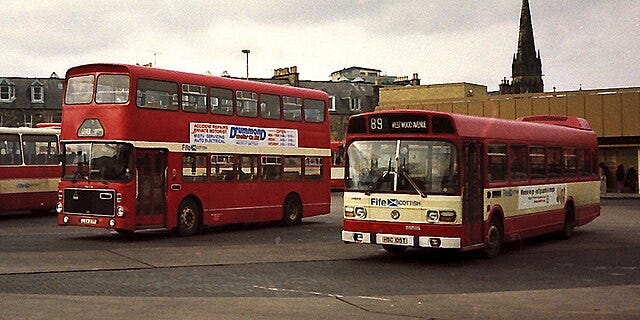Buses In Scotland - Why Are We In This Mess? 1985
This is the fourth article in a series covering the annus horribilis.
Access the last article in the series here: 1980 - 1984
So, buses in Scotland – why are we in this mess?
Ultimately, this piece of legislation is the reason that your local bus is unreliable, expensive and less regular than it used to be. This is why you may have multiple operators running the same route but you can’t use the same ticket across those operators. In fact, if you don’t know the number of your local bus going into town, this legislation is probably why!
Where the 1980 Transport Act opened the door for competition for services, the 1985 Act blasted it off its hinges. It completely abolished:
1) road service licensing (outside London),
2) the body of Traffic Commissioners allowing for only one per traffic area,
3) municipal bus companies (outside London),
4) The state-owned National Bus Group in England
Without road service licensing bus networks were now completely unfettered with no oversight from anyone, public servant or otherwise.
Operators were still required to register their services with the Traffic Commissioner but they were completely powerless to control routes or fares, and operators could freely enter or leave the market with no regard for passengers who rely on the services.
In England, the nationalised bus groups were required to make preparations for the “disposal” of the companies. The state forced the public entity to be sold to private individuals. Their main objectives in preparing for this sell-off was to ensure competition between the former bus group companies. For the time being, Scotland was spared of this.
Notably, London was exempt from this deregulation although they moved from a municipal bus company to a franchising model (more on that later) which allowed private operators to run the routes on behalf of the public body.
The intended consequence of this Act was that the lower barrier to entry into the bus market would increase competition. This increased competition would improve service levels and cut fares as the companies would vie for passengers (read: customers).

De-regulation of public transport was the pinnacle of the 1980s free-market thinking.
Where, in 1930, the private operator would apply for a road service licence to the three Traffic Commissioners for the area, who would review it and decide whether it was in the public interest, by 1986 these were abolished, the operator was only required to give the Traffic Commissioner 42 days’ notice of their intended route. The Traffic Commissioners could not reject the application based on duplication of an existing service, because of unreasonable fares or because of unnecessary competition with other modes of transport.
This is why your bus to the nearest train station arrives 3 minutes after the train has left, or leaves 3 minutes before the train arrives. This is why all of the local bus services in your area can cease at the drop of a hat, even in the Transport Secretary’s own constituency. This is why it now costs you an arm and a leg to go half a mile to the shops and back.
Where there were six Traffic Commissioners across Scotland’s two Traffic Areas in 1930, by 1985 there was one—appointed solely by the transport minister, local authorities now had no official input.
Where there were municipal bus operators accountable to the public through the councils, corporations or transport authorities, now there were private companies who were not accountable to anyone, even the Traffic Commissioner.
The Traffic Commissioner is an all-but ceremonial role now, a monument to better legislation, armed with little more than a rubber stamp.
The legislation prohibited councils from owning and running a bus company, instead they had to be transferred to an arms-length company and it explicitly removed the duty for any remaining state-owned bus group company or municipal company to cooperate to design routes.
A complete free-for-all.
The PTA/Es were still required to formulate general policies for public passenger transport services and to provide subsidies to operators for services which would otherwise not be operated. This is what we now call socially-necessary services, which private companies won’t run due to being unprofitable. This remains of key importance today.
What should have been obvious at the time was that many bus routes are not profitable but still necessary and this legislative duty was going to lock us into ever-increasing public subsidies… perhaps it was obvious.
Access the next article in the series here: 1986 - 1999


Check out Philip Alston's report on the impact of bus deregulation on human rights:
https://www.getglasgowmoving.org/news/press-release-campaigners-welcome-philip-alstons-report/
It's just shameful that the Scottish Government has presided over this insane system for so long 😡
Fife Scottish buses 😭 this same model is still being played out in our postal service. It's mental.